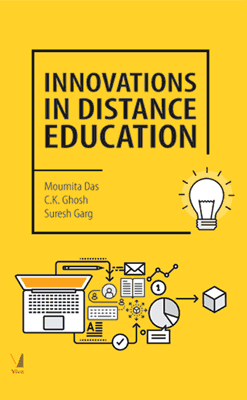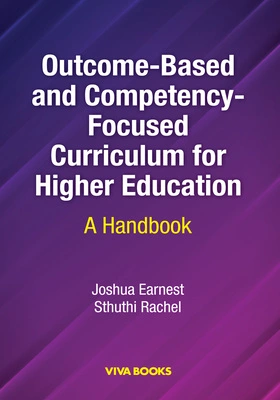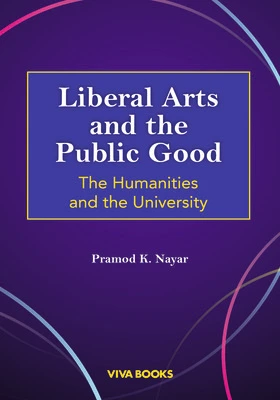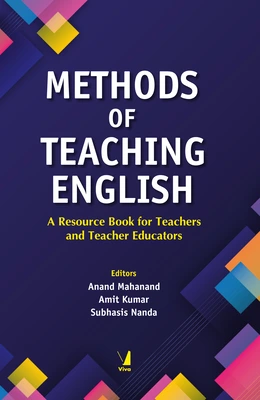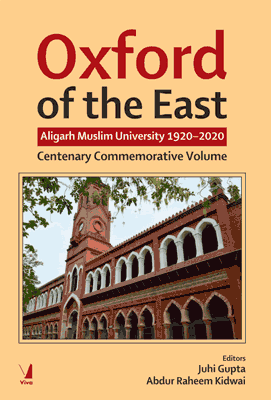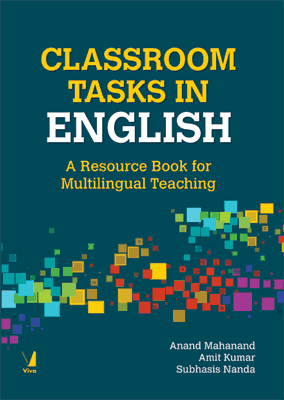Innovations in Distance Education
Innovations in Distance Education
₹895.50 ₹995.00 Save: ₹99.50 (10%)
Go to cartISBN: 9789389662931
Bind: Hardbound
Year: 2020
Pages: 280
Size: 6 x 9 Inch
Publisher: Viva Books Originals
Sales Territory: Worldwide
This book shares innovative ideas and initiatives with the higher education fraternity in general and Open and Distance Learning practitioners in particular to further the cause of excellence through the integration of these ideas into their future curriculum design and development, research and practice. This work will reignite the debate on innovations in imparting instruction at a distance to tertiary students and provide new insights to all those involved in planning and administration of education.
This book discusses the uniqueness of distance education - an innovation in itself. Since it is characterized by transformation and change, exciting innovations are being introduced in it continuously. Distance education inspires an individual for higher learning while being at the workplace or home with compelling schedules. It offers a plethora of programmes to people from diverse walks of life, including working professionals, army men, housewives, school dropouts and divyangs to enhance their career needs or satisfy the urge for new knowledge in the A-3 paradigm for inclusive ecosystem. Distance education is the only system that can cater to the masses - the unreached, underprivileged and deprived who are on the margins of development. With the introduction of Information and Communication Technologies (ICTs) in the delivery of education, innovations such as online learning and mobile learning, Open Educational Resources (OERs) and Massive Open Online Courses (MOOCs) have become extended arms of education at a distance. This book explores the remarkable philosophy and pedagogy of learning at a distance flexibly.
It is universally accepted that challenges posed by issues of quality, access and cost need innovative solutions for learner support. This book presents some recent innovations introduced by Indian as well as foreign universities offering education at a distance. These conform to quality assurance benchmarks laid down by statutory bodies in the respective countries. This book will serve as a ready reckoner for a wide variety of readers, and help them in creating an innovative, prosperous and educated India.
Target Audience:
This book would be helpful as a ready reference to a wide variety of readers including scholars, administrators and policymakers of ODL system, in addition to stakeholders in conventional universities in their quest for seeking knowledge about innovation in education in general and DE in particular.
Contents:
Foreword
Preface
Introduction
Chapter 1. Open and Distance Learning: A Disruptive Innovation in Education • Introduction • The Conventional Higher Education System • Open Distance Learning: An Innovative System • The Beginnings • World Scenario • The Indian Context • Transition to Open Era • Understanding Open Learning • Innovative Characteristics of Open Learning • Distance Education: Some Definitions • Profile of Distance Learners • Pedagogy of Open Learning • Modes of Instructional Delivery • Media in Distance Education • Evolution of Distance Education • Changing Scenario of Distance Education • The New Learner • Increasing use of ICT in Teaching-Learning: Indian Experiences • Virtual Universities • Learning Content Management System • Learning Management System • Changing Pedagogic Principles • Changes in Curriculum
Chapter 2. Need for Innovations in the ODL System • Introduction • Systems of Education • Correspondence Education: The Beginning • The Open Era • Indira Gandhi National Open University • Teaching Need-Based Programmes • Teaching Science at a Distance • Higher Science Education Offered by IGNOU • Developing Scientific Temper • Attitude of the Functionaries towards Practicals • An Experience to Remember • National Centre for Innovations in Distance Education • Need for Innovations in the ODL System • Challenges Presented and Innovations Required • Challenges of Scholarship and Research • Areas of Innovation • Diffusion of Innovation • Quality Management and Benchmarking • Total Quality Management Practices • Valley City State University • International Association for K-12 Online Learning • Anadolu University Improvement Project • Quality Assurance in Student Assessment and Examination • Quality Assurance System for E-learning
Chapter 3. Innovations in Learner Support • Introduction • Pre-admission Counselling and Admission • University and College Admissions Service • Yashwantrao Chavan Open University, Nashik, Maharashtra • Mobile Technology based "Just in Time" Student Support Service • Examination and Evaluation • On-Demand Examination • E-assessment using OpenMark • Self- and Peer-marking of Examinations using Model Answers and Answer Banks • Statement Banks • Equipped for the Future • Authentic Self and Peer Assessment for Learning • Study Centre based Support • Innovative Learner Support Programme • One-stop Student Support Services
Chapter 4. Innovative Applications of ICTs in Open Education • Introduction • Selection of Technology • Radio • Educational Television and Teleconferencing • Satellite-Based Education: EduSat • Computer as a Learning Tool: Internet and Online Learning • Mobile Learning • Innovative Practices of ICT Applications • Intute • E-library • Mobile Library Project • e-Reader Project • Sakshat
Chapter 5. Recent Innovations in ODL • Introduction • New and Emerging Vocations • Interventions for the Differently-abled • Promoting Teacher Preparation Programmes in the Field of Special Education • Provide Equal Educational Opportunities to the Disabled • Education Technology • Web 2 Tools • Learning Management System and Learning Content Management System • Educational Wiki • Educational Blogs • Podcasts and Vodcasts • Platforms for Sharing Videos, Documents, Presentations and Images • Social Networking Sites • Voice over Internet Protocol Service • Gamification • Multi-User Virtual Learning Environment • Virtual University • Library 2.0 • Communication Devices • Mobile Learning • Assistive Technologies • Cloud Computing • Universal Design for Learning • Learning Objects • Characteristics of Learning Objects • Open Education Resources and MOOCs • Educational Policies to Cater to Issues of Access, Equity and Quality • Credit Transfer • Australia • UK • USA • Europe • India • Accreditation • International Scenario • The Australian Qualifications Framework • Quality Assurance Agency for Higher Education, UK • Accreditation in the USA • European Qualifications Framework • Accreditation in India • Recognition of Prior Learning and Exemption Mechanisms • Recognition of Prior Learning • Choice Based Credit System
Chapter 6. Innovative Programmes in ODL • Introduction • Developing an Innovative Programme • Instructional Design • Content • Innovative Programmes in the ODL System • Certificate Programme in Craft and Design (Pottery) • Certificate Programme in Motorcycle Service and Repair • Certificate Programme in Early Childhood Special Education Enabling Inclusion (Cerebral Palsy) • Certificate Programme in Competency in Power Distribution (For technicians) • Postgraduate Diploma in E-Learning (PGDEL) • Diploma in Desktop Publishing (DDTP) Programme • Innovative Programmes in Agriculture • E-learning of Physical Science through Sports (ELPSS) • Certificate Programme in Industrial Studies
About the Authors
Index
About the Authors:
Moumita Das is Assistant Director at the National Centre for Innovations in Distance Education, Indira Gandhi National Open University, New Delhi.
C.K. Ghosh retired from his services at the Indira Gandhi National Open University, New Delhi, after serving it for more than 27 years.
Suresh Garg is Vice Chancellor, Usha Martin University, Ranchi. He has been professor of Physics (and Director, School of Sciences, Pro-Vice Chancellor and Vice Chancellor I/C), Indira Gandhi National Open University, New Delhi.
